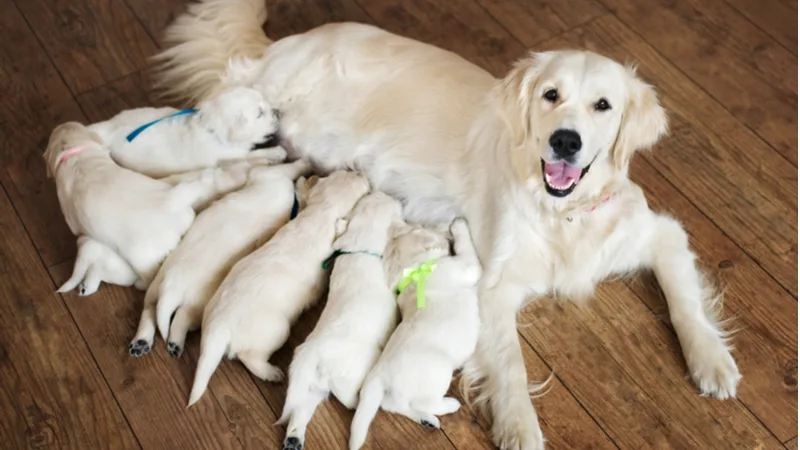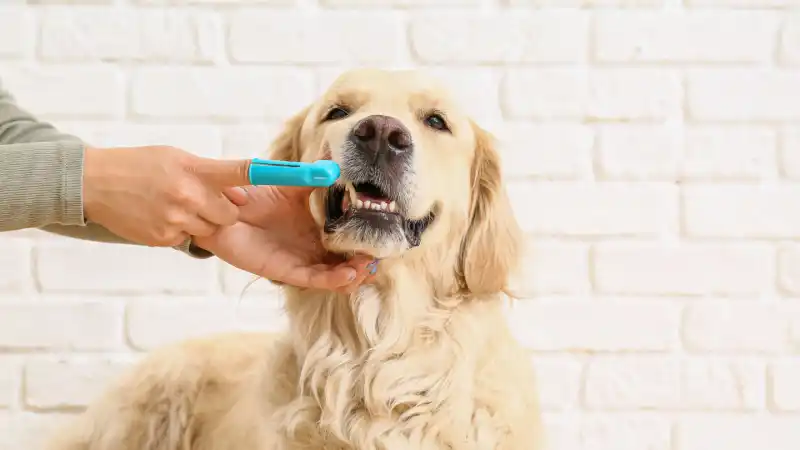How to Prepare for Your Dog's First Litter of Puppies
Breeding a dog requires a lot of preparation, especially for your first litter. Here's everything you need to consider before birthing a litter of puppies at home.

There are many factors to consider before breeding your intact female dog (known as a bitch) and bringing a litter of puppies into your home. Yes, in theory you can put a female dog that is in heat with a male dog, and more than likely, she will become pregnant. This does happen regularly as evidenced by one trip to the humane society. But, if you really want to ensure a good outcome, with healthy puppies and breed-line integrity, you should do your homework.
Things to Do Before You Breed Your Dog
The first thing to do is sit down and write your dog’s history. Have there been any medical issues, such as signs of lameness, skin allergies, or other problems? You must also consider their personality: Are they friendly, nervous, or aggressive towards other people or family members? Write down anything that may be of a concern and be honest with yourself. Remember: the goal is healthy puppies with the best chance for a long, happy life.
Next, contact your veterinarian and let them know you want to schedule an exam to discuss breeding your intact female dog (a spayed dog can’t be bred). At this visit, your veterinarian will review your pet’s history, perform a physical exam, and may recommend testing to assess their health, such as blood work and parasite screening. Depending on the breed, your veterinarian may recommend additional specialized screening for common genetic traits that can be passed on such as hip dysplasia, congenital heart conditions, eye issues, and various other problems.
Genetics play an important part in breed lines and certain breeds have common genetic disorders that can be passed on to the puppies, even though they may not show outward signs of the disorder. Organizations like the non-profit Orthopedic Foundation for Animals (OFA) provide information about genetic disorders by breed:https://www.ofa.org/browse-by-breed
Your veterinarian will also discuss parasite prevention before and during the pregnancy, because fleas, intestinal parasites, and heartworm disease are a concern in all dogs, including those that are pregnant. They will communicate with you about the preventives that are safe for your dog and the puppies during pregnancy. They will also review your dog’s vaccine status and make recommendations. Being up to date on vaccines is important as it ensures maternal antibodies (protection against viruses) are passed to the puppies while they are nursing.
Once it is determined that your dog is a good candidate to be bred, you will need to find a stud dog. A good idea is to join a breeding club that can help you locate a good match for your specific needs. This will also help in finding a stud dog that has gone through the appropriate screening, just like your female dog. Both dogs having healthy screens and a good disposition will lead to the best chance of happy, healthy puppies.
Once a stud is located, you will need to determine whether your bitch will undergo natural breeding or if artificial insemination is a better choice. Natural breeding is when both the bitch and the stud dog physically meet, the bitch is receptive, and the stud mounts. Artificial insemination (AI) is when semen is collected from the stud dog and a pipette and syringe are used to inject the semen into the vaginal canal of the bitch. In either case, a good understanding of the bitch’s estrus cycle (or heat cycle) is important for success, especially with AI. If you do not have a good idea of your dog’s heat cycle, your veterinarian or members of a breeder’s club can help you understand the cycle and when it is time to breed.
Natural breeding usually starts with introduction of the stud six days after the heat cycle begins. The bitch is presented to the stud and once she is receptive, they should be allowed to breed every two to three days until she doesn’t allow him to mount. This will happen 14-17 days after the first day of the heat cycle.
If AI is selected, it is recommended that you have an experienced veterinarian or breeder perform the procedure, especially since this is your first litter. There are a few different techniques for AI, but the most common is transvaginal insemination. The technique is most successful when timed appropriately during the heat, with fresh semen collected from the stud, and immediately inseminated into the bitch.
Finally, when preparing for a litter, having a plan for the puppies once they are ready to be adopted into their forever home is essential. Litter size can vary, but can range from 1-12 puppies with adoption typically starting at 8–12 weeks of age.
Other Items to Remember After Breeding
There are, of course, many other things to research and prepare for before you have a litter of puppies:
Ensure your dog’s nutrition before and during the pregnancy.
Confirm conception was successful from natural breeding or AI via hormone testing, ultrasound, veterinary palpation, or x-rays. Some of these techniques will let you know how many puppies are going to be born, which is an important factor during birth.
Plan for the birth and know how to care for the puppies immediately after birth.
Prepare a safe, warm space where the puppies can be raised. Newborn puppies’ eyes are closed for roughly the first 10 days of life and they can wander off if not kept in a safe area. You will also need to make sure all of the puppies are nursing properly.
Plan for transitioning the puppies from the bitch’s milk to a formulated puppy food.
Schedule routine or wellness exams with your veterinarian for the puppies, including a vaccine plan. Vaccines are typically started around 7-9 weeks of age.
You should be aware of complications that can occur during pregnancy, birth, and postpartum. A few examples of complications are dystocia (the puppy can’t get through the birth canal), emergency c-section, and hypocalcemia. All of these situations require medical attention from your veterinarian or a visit to the emergency room.
While preparing for the litter, consider Breeding Coverage* from AKC Pet Insurance (underwritten by Independence American Insurance Company), which can help with unforeseen accidents, illnesses, or complications of breeding, pregnancy, whelping, or nursing.
Having a litter of puppies is a big responsibility and requires preparation to ensure the best outcome for your dog and her new puppies. Completing your due diligence, rather than rushing to breed, will make the process more successful and less stressful.
*Not available in all states. See terms and conditions for complete details regarding coverage, exclusions, and limitations.

Every Dog and Cat Deserves the Pet Insurance of Champions
Get prize-winning care for your pets.
Dr. Preston Turano graduated from the University of Illinois College of Veterinary Medicine in 2002. Since that time, he has been a Veterinarian, Medical Director, and Practice Owner.
READ MORE ARTICLES

